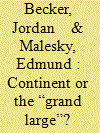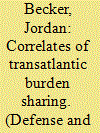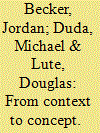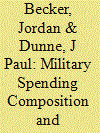|
|
|
Sort Order |
|
|
|
Items / Page
|
|
|
|
|
|
|
| Srl | Item |
| 1 |
ID:
153923


|
|
|
|
|
| Summary/Abstract |
We argue that NATO allies exhibiting more “Atlanticist” strategic cultures allocate a greater share of their defense resources to Alliance priorities than those exhibiting “Europeanist” strategic cultures. Our analysis builds on policy discussions regarding imbalances in burden-sharing in transatlantic security. Scholarship in the fields of international security and political economy offers plausible explanations for these imbalances, but does not address how allies allocate resources within defense budgets and does not statistically test effects of cultural variables on such decisions. Using evidence from 89 national security strategy documents of 24 NATO allies, we argue that the more states’ strategic cultures tend toward Atlanticism, the more resources they allocated to military operations during a period in which such operations were the Alliance’s top priority. During the height of NATO’s “out of area” period from 2000 to 2012, there was a strong, positive correlation between, on the one hand, Atlanticist language in such documents and, on the other, allies’ allocation of financial resources to military operations—as opposed to personnel, infrastructure, or equipment.
|
|
|
|
|
|
|
|
|
|
|
|
|
|
|
|
| 2 |
ID:
154334


|
|
|
|
|
| Summary/Abstract |
While recent work has attempted to update the research agenda for transatiantic defense burden-sharing, there remain significant gaps between the public choice defense economics literature and the security studies literature. The presence of such a gap is unfortunate, because defense spending choices are likely shaped by factors identified by the public choice literature, as well as the strategic and cultural variables that the security studies literature tends to focus on, as well as domestic macroeconomic factors. The independent variables identified in recent qualitative literature are extremely useful analytically, and, fortunately, they have reasonable proxies in available quantitative data, which enables scholars to study them across large groups of countries and many years. This article builds upon such work to synthesize the most notable of the factors identified in the current literature, and offers some common analytical ground that will benefit both scholars and practitioners..
|
|
|
|
|
|
|
|
|
|
|
|
|
|
|
|
| 3 |
ID:
171712


|
|
|
|
|
| Summary/Abstract |
Resource allocation to and within defense budgets is grand strategy. NATO and the EU coordinate defense planning and encourage fair burden-sharing among their members. We analyze the effect of agreed planning processes, namely the “NATO Defense Planning Process (NDPP)” on the conversion of political will to resources and then to capabilities development across the transatlantic security community. In a “fog of peace” featuring diverse threats, and in which allies may disagree on strategic rivals and sources of risk, national and regional political economies shape strategy, not the other way around.
|
|
|
|
|
|
|
|
|
|
|
|
|
|
|
|
| 4 |
ID:
186536


|
|
|
|
|
| Summary/Abstract |
This article introduces ten essays capturing ten panel discussions held by the Department of Social Sciences at the United States Military Academy on 3-4 February 2022, in support of the drafting of NATO’s 2022 Strategic Concept. While the shadow of the Russo-Ukrainian war hung heavy over the proceedings, participants sought to take both a long and a broad view, contemplating NATO’s role in a changing international order. NATO allies must assimilate these changes into their collective and national strategies, but they are first and foremost agents themselves, whose strategies can and should shape the future. The participants asked challenging questions about what international order(s) might look like in the proximate future, and how NATO allies could shape that proximate future. The authors of this introductory essay contend that while simultaneous competition with China and Russia will be a (perhaps the) central feature of the international security landscape for years to come, the act of competing does not a Strategic Concept make. Allies must grapple with interrelated issues ranging from the evergreen question of transatlantic burden-sharing to the assimilation of emerging technologies into strategic and operational planning. The transatlantic security architecture anchored by NATO will have to be incorporated into a broader, global security network to manage competition with China and Russia while holding fast to the democratic values that are at NATO’s heart.
|
|
|
|
|
|
|
|
|
|
|
|
|
|
|
|
| 5 |
ID:
189399


|
|
|
|
|
| Summary/Abstract |
In the large literature on military spending and growth, the heterogeneity of the categories of expenditure is seldom considered. Military spending is used to pay for a variety of things, including salaries, large weapon systems, and physical infrastructure, along with ongoing operations, training, and readiness - each of which might be expected to have different implications for economic growth. One reason for the focus on aggregate spending is the lack of disaggregated cross-country data, but there are some data available from NATO and the EU that break military spending into personnel, equipment, infrastructure and other expenditures (primarily operations and maintenance). This paper uses these data, available for 34 countries, for as many as 49 years, to investigate whether the composition of military budgets affects economic growth. Estimating standard growth models with this data it finds that as expected there is considerable heterogeneity in the effects of the different components. Specifically, the negative correlation between military spending and growth found in recent studies is primarily driven by personnel expenditures, and - slightly less clearly - by operating expenditures.
|
|
|
|
|
|
|
|
|
|
|
|
|
|
|
|
|
|
|
|
|